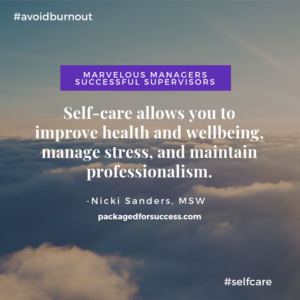Stress can be positive or negative. It is a normal reaction the body has when changes occur. It is your body’s way of responding to any kind of demand or threat. The body can respond to these changes physically, mentally, or emotionally. Stress can save your life in an emergency or become motivation to excel. Frequent or long-term stress, however, is linked to various health conditions. Negative stress can lead to overwhelm or the feeling of drowning, carrying a heavy weight, or being buried beneath something. Negative stress in the workplace can lead to burnout. Burnout is a state of chronic stress that leads to physical and emotional exhaustion, cynicism and detachment, and feelings of ineffectiveness and lack of accomplishment. Self-care is self-preservation. Regular self-care prevents overwhelm and burnout.
Self-care is a universal challenge.
Although regular self-care is essential to overall health and wellness and sustained personal and professional success, it is often ignored or avoided. Self-neglect or poor self-care practices is no respecter of person. People of various genders, religions, socioeconomic status, cultures, and occupations struggle with making self-care a priority.
Self-Care Is Not Selfish
Self-care is the deliberate activities you engage in to safeguard your mental, physical, and emotional health. Self-care is about maintaining your wellbeing not an occasional special treat. Self-care is essential – eating well, regular exercise, proper sleep and rest, intellectual stimulation, healthy emotional outlets and supports, fun and leisure, loving relationships, spirituality, and positive mindset.
Barriers to Self-Care
Traditional male and female roles can prevent men and women from practicing self-care. Men are expected to be providers and protectors and often feel they cannot ask for help, express their emotions, decrease work hours, or follow their occupational dreams. Women are expected to be nurturers and caretakers which often leads to self-sacrifice and putting everyone’s needs before their own.
Many cultures resist individualism and encourage prioritization of the family unit. Placing individual needs and wants after collectives needs or wants can manifest in financial obligations, arranged marriages, selected occupations, or even where one makes a home.
Most religions place great value on giving and service. A mandate to “make the world a better place” can lead to guilt and self-sacrifice that may then result in mental, physical, and emotional exhaustion.
Self-sacrifice for workers in some occupations, including social work and education, is seen as the norm and going against the grain is selfish. In some instances, being “overworked and underpaid” has been viewed as a badge of honor. Social work and teaching are on the list of high turnover careers along with nursing, hospitality, and fast food to name a few.
Most people believe that self-care is expensive vacations or spa treatments which is not true. Wealth does not guarantee proper self-care. Many wealthy individuals worry about losing their wealth which causes unhealthy stress. They may overwork themselves or do high salary work they dislike to maintain status and riches. Poverty is also stressful. Low income people may overwork themselves with the hope of getting out of poverty thus ignoring regular self-care.
Create A Self-Care Plan
A self-care plan can help you improve health and wellbeing, manage stress, and maintain professionalism. There is no “one-size-fits-all” self-care plan. We all have different needs, goals, values, barriers and strengths. An understanding of your values, non-negotiables, and stressors is essential to developing a plan that cultivates a commitment to activities that bring you joy and comfort.
Related:
- Make Vacation A Part of Your Self-Care Routine
- Make Professional Development A Part of Your Self-Care Plan

Nicki Sanders, MSW, is a travel and cupcake lover with a passion for self-discovery and career advancement. She has a strong background in developing and managing interns and successful internship programs. She is an accomplished manager, professor, coach, trainer, and group facilitator who has packaged her Master of Social Work degree and 20 years of diverse work experience into Packaged For Success Enterprises, a full-service training and professional development company.
© 2018 Copyright Protected. ALL RIGHTS ARE RESERVED.